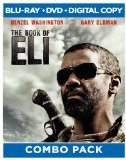| Reviews & Columns |
|
Reviews DVD TV on DVD Blu-ray 4K UHD International DVDs In Theaters Reviews by Studio Video Games Features Collector Series DVDs Easter Egg Database Interviews DVD Talk Radio Feature Articles Columns Anime Talk DVD Savant Horror DVDs The M.O.D. Squad Art House HD Talk Silent DVD
|
DVD Talk Forum |
|
|
| Resources |
|
DVD Price Search Customer Service #'s RCE Info Links |
|
Columns
|
|
|
Book of Eli, The
Warner Bros. // R // June 15, 2010
List Price: $35.99 [Buy now and save at Amazon]
The Film:
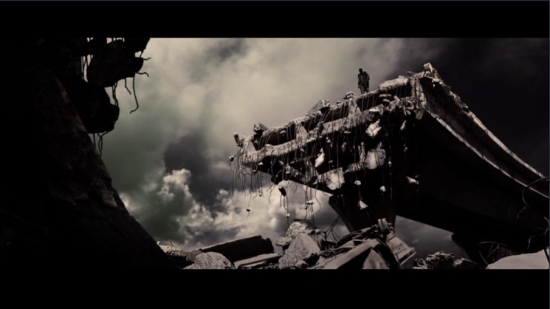
Religion can be a dangerous thing. Not belief, mind you, which roots in a personal decision, but the actual institution that shapes what you believe, like a slab of clay on a spinning wheel. In the right hands, it can be rewarding and offer a sense of community; in others, it can be restricting, painful, and damaging. The Book of Eli, a gritty post-apocalyptic grind in the eyes of From Hell and Menace 2 Society directors Allen and Albert Hughes, pivots around this idea, while molding a hero out of Denzel Washington that protects a book of belief for that very reason. While a man defending this relic of faith-based society to the tooth for merely personal reasons might not strike a chord of authenticity, seeing a man brashly slice through marauders so that the wrong hands don't maliciously contort the book's context certainly does. That makes the Hughes Brothers' film somewhat daring, all while they retain a sense of exhilaration about the dusty, visceral action.
Eli (Washington), sporting sunglasses, worn clothing, saran wrap on his feet, and a small arsenal in his backpack, hikes from location to location with the aim of going west, sporting unexplained skill with a blade and bow 'n arrow that's meant to be pre-build survivalist knowledge in our eyes. He stops at a decrepit house and listens to an MP3 player while setting up camp, made possible by a small rechargeable power source that we're shown later in the film (just saved a little mind-nagging there). The wasted land of post-"flash" America presents numerous challenges to nomads like Eli, including a dire lack of water, but most of these obstacles are man-made: dirty, gruff thugs on the road looking to steal from and kill on-comers, helpless women used as bait for wanderers, and small reconstructed cities lorded over by powerful mongers like Carnegie (Gary Oldman) holed up in a ritzy part of town and enjoying the luxuries the peons only dream of. All along the way, Eli stops everyday and reads from a book with a cross etched on, allowing no others to read or even lay their hands on it.
Compiling superb production design that's lensed by Spider-Man and Cast Away cinematographer Don Burgess, the environment on the road leading west in The Book of Eli ascribed to a conventional post-apocalyptic state, with a disparity and violent energy akin to that of a combination of Mad Max and the Fallout series of video games. A mix of computer-generated effects and focused cinematography etches out a destroyed landscape that's magnetic to the eye, highlighted by over-the-shoulder looks with Eli glancing at wanderers and peering down from a gap in an overpass road once part of a spaghetti junction. He slowly struts along endless expanses of abandoned cars and even more empty stretches of desert, leading to a town that's, for all intents and purposes, akin to a Western-style hub, complete with saloons, shifty provision locations, and brutish bandits. It doesn't hinge on the same desolate, sparse realism as John Hillcoat's The Road, instead building an environment ideal for brash action amid the remnants of civilization.
As Eli recharges his batteries in the town, both literally and figuratively, the real conflict begins to manifest within The Book of Eli. Villain Carnegie, ham-fistedly forced in a way that only Gary Oldman can do with a vein of legitimacy, has been sending his minions out to find the very book that Eli has brought into the hornet's nest. There, Eli also meets Solara (Mila Kunis), daughter to a blind woman and a soul yearning to escape from Carnegie's grasp. She catches wind of his book, while within his living area at the forced whims of Carnegie, and quietly wishes to hear about its contents; the obviousness behind her place as a "disciple" to the book's word can be a little bold, but Mila Kunis surprises with her validity as the lost yet strong Solara. Naturally, they all vie for concentration against Washington, who's just as expected as Eli -- composed, complex, and strapping, all wrapped up in, as Harvey Keitel would say, "a mean, mhm mhm servant of God" -- as he pumps soundness into his character as a machete-wielding nomad on a mission. Though violent, Eli's actions are also of a pious nature, denying himself desires of the flesh, teaching Solara about prayer before a meal, and forgiving evil-doers when possible.
That's the kind of picture that The Hughes Brothers focus on, a balanced hybrid of protective bursts of bloodshed and blunt but operative socio-religious allegory, and it's ambitious in what it thrusts at us. In that, you could consider it a ruthlessly adult take on religion's magnitude, while also retaining a shrewd level of exuberance about its activity for pure amusement's sake; at one point, Eli has to fend off a full bar full of brainless thugs, slicing through them as sprays of blood and thuds against the ground echo all about. The way it's shot, the grace of movement during the action, and the sense of importance within Eli as he protects what he's carrying are hand-in-hand suggestive and exhilarating. It doesn't hurt that the action's construction staggers with its veracity, especially the sober hand-to-hand combat. In that, the subtext stirs liberally with the engaging chaos, causing it to veer from seeming "preachy" about its aims. Eli's protecting a book, THE book, but it's easy to absorb just the "protect", the survivalist, aspect of it.
Yet, it's "the book" and its content that naturally creates a stir in The Book of Eli, adding a level of thought-provoking gravity to the picture that utilizes religion as both a potential weapon and a saving grace for society. Does the viewer have to be a "believer" in the book's context to grapple the magnitude of the picture's thought? I don't believe so, as even the most rigid of non-believers can pick up on the prospect of religion being a dangerous tool if used falsely by those who hold power -- maybe even more so. Within that, Gary Whitta's script finds a happy medium between Eli's quest being a "pilgrimage" to carry on faith and a staunch defense against the corruption of an already-crippled society. It's also got a thinly-veiled sense of humor that peeks out a few times, joking around with the desolate notion of cannibalism and the way which people used to eat meals at a dinner table. The dark-around-every-corner material needs this easing of tone, though getting it less frequently than desirable.
The Book of Eli leads up to a conclusion to the bloody slicing and tippy-toe thematic content that's a shade on the impractical side with its core twist. But, surprisingly, it's so distinctive that the irrationality behind it can easily be disregarded. Clues are tossed into The Hughes Brothers' film throughout that suggests this conclusion, to the observant, yet it's only after the reveal -- and after a bit of a stunned sensation in seeing what we've seen -- that it'll all come together in outrageously satisfying fashion. Moreover, this finale also packs a punch with its messages about the survival of humankind and the safeguarding of society's past, in a way that's easy to digest yet slackjaw-inducing for what's essentially an action film with brains. Between powerhouse performances, especially from Denzel, a sublime aesthetic, and the ways in which sociological thought sparks amid finely-assembled, firmly R-rated violence, it's a blend of streamlined components that's insatiably compelling to behold as a whole.
The Blu-ray:
Warner Brothers present The Book of Eli in a standard double-disc package, with Disc One being the Blu-ray and Disc Two being a bare-boned DVD / Digital Copy combo disc. A nice, cardboard slipcover has been included that replicated the look of a book on the spine of the presentation -- a slick touch.
Video and Audio:
The high-definition experience that Sony's Blu-ray of The Road forces on-screen, a drab and murky image that accurately retains the utterly bleak look of John Hillcoat's film, isn't the same sort of high-definition experience that Warner Brothers serves up with The Book of Eli. Framed at 2.35:1 and vaulted within a 1080p VC-1 encode that sits at between 15 and 19 mbps on average, there are a lot more opportunities for ferocious textures, contrast complexity, and rigid movement through the action sequences. Similarly, it's a heavily gray image that concentrates of scaling degrees of clays, muted tans, and rich blacks, with hardly any rays of colorful content to be seen until near the end of the picture -- and it all looks exquisite here. Shot with RED One high-definition cameras, much like the ones utilized on Neill Blomkamp's District 9, this dreary, dusty post-apocalyptic atmosphere looks striking.
As we peer over Eli's shoulder while he's glancing down cautiously at the road he's been walking on during one sequence, it embodies just about every impression formulated on roughly three-quarters of the film. His eyesight falls on contorted metal, rocky debris, a dusty haze and a relentless array of contrast levels, supported with sustained and crisp composure. A few textures will seem a bit smooth in certain spots throughout the picture, such as the worn road itself and semi-distanced walls, while others will stun with their clarity -- such as a sequence involving Eli walking towards us on his pathway west, with the grain of another stretch of highway, the texture of mountains, and the rubble all about him. Other scenes, once in Carnegie's clutches at the town, experience splashes of light and more maroon-leaning colors in dimly-lit rooms, which can offer higher-bitrate digital sequences. Most importantly, the action sequences preserve the blitzed, starkly photographed motion without distortion, while ink contrast levels and sun-baked lighting appear unscathed and appealing to the eye.
This experience also hinges on a robust aural onslaught, complete with swiping blades, a fury of gunshots, hand-to-hand combat blasts and other chest-slamming sounds, which the DTS HD Master Audio matches against the visual treatment with equal ferocity. Bombastic audio elements backdrop Eli as he's walking in slow-motion, giving a level of bloated swagger as he struts across the screen, with musical elements trickling to the rear channels with attitude. Yet it's the action sequences that, obviously, steal the show, and there are quite a few doozies wedged into the picture -- including one onslaught on a small house that's an easy entry as a system demo, complete with high and low-level gunshots, bazooka explosions, flare billows and debris splintering from wood. The crisp splings of a blade pierce the high-end of the sound spectrum, while dialogue always remains balanced and audible against the atmosphere to appropriate and enveloping degrees. In short, it's an excellent modern sound design for an aggressive action flick, and it's exactly what was hoped for. English and Spanish 5.1 tracks are also available, along with optional English SDH, French, and Spanish subtitles -- which, for projector owners, will be an aggravation since they appear directly underneath the actual image.
Special Features:
Maximum Movie Mode:
Glancing at the disc specs, one might notice that a Hughes Brothers' commentary hasn't been included. There's a reason for that: this Blu-ray comes equipped with a "survival guide" mode that plants interviews with The Hughes Brothers and production designers, concept art/storyboards and other elements in our view as the film goes along -- and it operates as a richly rewarding interactive experience that mirrors the likes of Silence of the Lambs and The Matrix for their density. A Picture-in-Picture dynamic gets started that takes the sketches, interviews, and supplemental footage, many found in special features accessible on the disc at other points, and slaps them in a concrete-like frame at the lower corners of the image, popping up flawlessly via the BD-Java tech.
Albert Hughes talks about how he didn't get the aesthetic of the film until listening to a Nine Inch Nails song that guided him into the manner of the picture, how they pieced together the central town out of found objects like tractor seats and freeway signs, the operatic house used for Carnegie's base of operations. Furthermore, a "Press Enter To..." option appears in the picture-in-picture at points, so the viewer can explore an element deeper -- which, after pressing the button, takes us into a snippet of an assembly featurette. As has come to be expected from Warner's interactive featurettes, this one encapsulates the gauntlet of special features into one solidly focused experience.
Focus Points (34:24, HD):
These pieces integrate into specific points of the film's construction process, and show how the production design and cinematography capture the look and attitude of The Book of Eli. Though they zero in on individual elements, the context of each featurette also incorporates generalized opinions about the concept art, the difference in the storytelling, how the film's constructed, and other points. They all offer excellent behind-the-scenes footage in showing how the film has been assembled, from construction of the forest and town to the graphic novel-like sketches, while only staying with us for brief time periods so that they can be integrated into the Maximum Movie Mode without dominating too much time. Here's the way that they're separated in these individual elements: The Look of Eli (3:32), Underpass Fight (3:11), Building Carnegie's Town (3:16), The Motorcycle Brigade (2:59), Eli Goes to Battle (3:29), Eli's Mission (1:54), Shootout at George and Martha's (3:53), Eli's Weapon of Choice (2:15), Solara Causes Mayhem (6:24), and Apocalyptic San Francisco (3:28).
Behind the Story: Starting Over (13:03, HD) and Eli's Journey (17:54, HD):
Here, the special features take a more thought-provoking direction, where the content focuses on what the world would be like in a true-to-form post-apocalyptic world. The film's creators and other professors / literary folk offer their insights on the subtext prevalent in the picture, from the construct of the "walking dead" disposition of humanity following a devastating disaster, the need for a spearhead individual to guide people through the light, and how we'd live our lives without our creature comforts -- using the things that are on us as currency to get us by, much like pioneers in the wilderness. The Starting Over featurette then proceeds to zero in on how faith in a higher power would be tailored to a post-trauma world, where the Eli's Journey piece delves into the overall atmosphere crafted through production design and conceptualization of the realm. Both of these feature superb interview time with the cast and crew, while splicing together bits of the film and behind-the-scenes snippets into the mix.
Rounding out the features, we've also got a short in-motion graphic novel that tells the story of Carnegie before the disaster, A Lost Tale: Billy (5:02, HD), as well as a few short Deleted / Alternate Scenes (1:53, HD) and a piece on the film's finely-tuned music entitled The Book of Eli Soundtrack (4:59, HD).
Final Thoughts:
As a sucker for post-apocalyptic material and an admirer of tension-driven performances from Denzel Washington and Gary Oldman, it cam as no surprise that The Book of Eli impresses with its dilapidated atmosphere and performance integrity from the actors -- though Mila Kunis' turn as Solara did take me aback with her wide-eyed depth. And, along with that, it's also not much of a surprise that the visceral prowess that The Hughes Brothers construct with the action kept me on-edge, since their vastly under-appreciated film From Hell evoked the same sensation. However, it's the obvious but prescient nature of its faith-based material that struck a chord, on top of accomplishing everything else embedded within its enthralling two-hour span. Between that, and Warner Brothers' finely-presented Blu-ray rich with an audiovisual punch and supplemental density, this became a surprising film that earns a High Recommendation from this direction. Sure, it could've dug deeper with its components, and the ending requires a level of belief suspension, but what it accomplishes as a multifaceted action flick more than trumps its quibbles.
Thomas Spurlin, Staff Reviewer -- DVDTalk Reviews | Personal Blog/Site

Religion can be a dangerous thing. Not belief, mind you, which roots in a personal decision, but the actual institution that shapes what you believe, like a slab of clay on a spinning wheel. In the right hands, it can be rewarding and offer a sense of community; in others, it can be restricting, painful, and damaging. The Book of Eli, a gritty post-apocalyptic grind in the eyes of From Hell and Menace 2 Society directors Allen and Albert Hughes, pivots around this idea, while molding a hero out of Denzel Washington that protects a book of belief for that very reason. While a man defending this relic of faith-based society to the tooth for merely personal reasons might not strike a chord of authenticity, seeing a man brashly slice through marauders so that the wrong hands don't maliciously contort the book's context certainly does. That makes the Hughes Brothers' film somewhat daring, all while they retain a sense of exhilaration about the dusty, visceral action.
Eli (Washington), sporting sunglasses, worn clothing, saran wrap on his feet, and a small arsenal in his backpack, hikes from location to location with the aim of going west, sporting unexplained skill with a blade and bow 'n arrow that's meant to be pre-build survivalist knowledge in our eyes. He stops at a decrepit house and listens to an MP3 player while setting up camp, made possible by a small rechargeable power source that we're shown later in the film (just saved a little mind-nagging there). The wasted land of post-"flash" America presents numerous challenges to nomads like Eli, including a dire lack of water, but most of these obstacles are man-made: dirty, gruff thugs on the road looking to steal from and kill on-comers, helpless women used as bait for wanderers, and small reconstructed cities lorded over by powerful mongers like Carnegie (Gary Oldman) holed up in a ritzy part of town and enjoying the luxuries the peons only dream of. All along the way, Eli stops everyday and reads from a book with a cross etched on, allowing no others to read or even lay their hands on it.
Compiling superb production design that's lensed by Spider-Man and Cast Away cinematographer Don Burgess, the environment on the road leading west in The Book of Eli ascribed to a conventional post-apocalyptic state, with a disparity and violent energy akin to that of a combination of Mad Max and the Fallout series of video games. A mix of computer-generated effects and focused cinematography etches out a destroyed landscape that's magnetic to the eye, highlighted by over-the-shoulder looks with Eli glancing at wanderers and peering down from a gap in an overpass road once part of a spaghetti junction. He slowly struts along endless expanses of abandoned cars and even more empty stretches of desert, leading to a town that's, for all intents and purposes, akin to a Western-style hub, complete with saloons, shifty provision locations, and brutish bandits. It doesn't hinge on the same desolate, sparse realism as John Hillcoat's The Road, instead building an environment ideal for brash action amid the remnants of civilization.
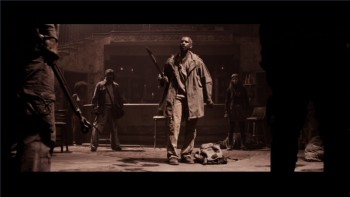 | 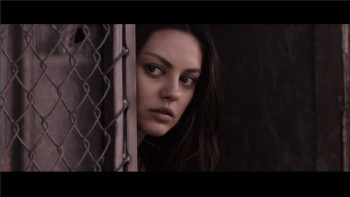 |
As Eli recharges his batteries in the town, both literally and figuratively, the real conflict begins to manifest within The Book of Eli. Villain Carnegie, ham-fistedly forced in a way that only Gary Oldman can do with a vein of legitimacy, has been sending his minions out to find the very book that Eli has brought into the hornet's nest. There, Eli also meets Solara (Mila Kunis), daughter to a blind woman and a soul yearning to escape from Carnegie's grasp. She catches wind of his book, while within his living area at the forced whims of Carnegie, and quietly wishes to hear about its contents; the obviousness behind her place as a "disciple" to the book's word can be a little bold, but Mila Kunis surprises with her validity as the lost yet strong Solara. Naturally, they all vie for concentration against Washington, who's just as expected as Eli -- composed, complex, and strapping, all wrapped up in, as Harvey Keitel would say, "a mean, mhm mhm servant of God" -- as he pumps soundness into his character as a machete-wielding nomad on a mission. Though violent, Eli's actions are also of a pious nature, denying himself desires of the flesh, teaching Solara about prayer before a meal, and forgiving evil-doers when possible.
That's the kind of picture that The Hughes Brothers focus on, a balanced hybrid of protective bursts of bloodshed and blunt but operative socio-religious allegory, and it's ambitious in what it thrusts at us. In that, you could consider it a ruthlessly adult take on religion's magnitude, while also retaining a shrewd level of exuberance about its activity for pure amusement's sake; at one point, Eli has to fend off a full bar full of brainless thugs, slicing through them as sprays of blood and thuds against the ground echo all about. The way it's shot, the grace of movement during the action, and the sense of importance within Eli as he protects what he's carrying are hand-in-hand suggestive and exhilarating. It doesn't hurt that the action's construction staggers with its veracity, especially the sober hand-to-hand combat. In that, the subtext stirs liberally with the engaging chaos, causing it to veer from seeming "preachy" about its aims. Eli's protecting a book, THE book, but it's easy to absorb just the "protect", the survivalist, aspect of it.
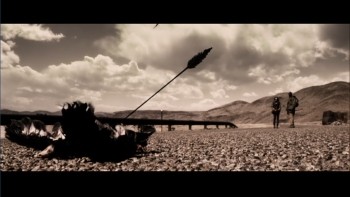 | 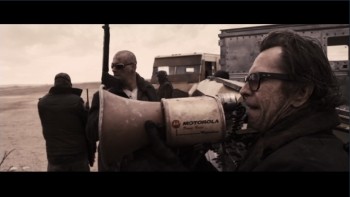 |
Yet, it's "the book" and its content that naturally creates a stir in The Book of Eli, adding a level of thought-provoking gravity to the picture that utilizes religion as both a potential weapon and a saving grace for society. Does the viewer have to be a "believer" in the book's context to grapple the magnitude of the picture's thought? I don't believe so, as even the most rigid of non-believers can pick up on the prospect of religion being a dangerous tool if used falsely by those who hold power -- maybe even more so. Within that, Gary Whitta's script finds a happy medium between Eli's quest being a "pilgrimage" to carry on faith and a staunch defense against the corruption of an already-crippled society. It's also got a thinly-veiled sense of humor that peeks out a few times, joking around with the desolate notion of cannibalism and the way which people used to eat meals at a dinner table. The dark-around-every-corner material needs this easing of tone, though getting it less frequently than desirable.
The Book of Eli leads up to a conclusion to the bloody slicing and tippy-toe thematic content that's a shade on the impractical side with its core twist. But, surprisingly, it's so distinctive that the irrationality behind it can easily be disregarded. Clues are tossed into The Hughes Brothers' film throughout that suggests this conclusion, to the observant, yet it's only after the reveal -- and after a bit of a stunned sensation in seeing what we've seen -- that it'll all come together in outrageously satisfying fashion. Moreover, this finale also packs a punch with its messages about the survival of humankind and the safeguarding of society's past, in a way that's easy to digest yet slackjaw-inducing for what's essentially an action film with brains. Between powerhouse performances, especially from Denzel, a sublime aesthetic, and the ways in which sociological thought sparks amid finely-assembled, firmly R-rated violence, it's a blend of streamlined components that's insatiably compelling to behold as a whole.
The Blu-ray:
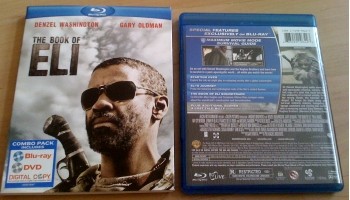 | 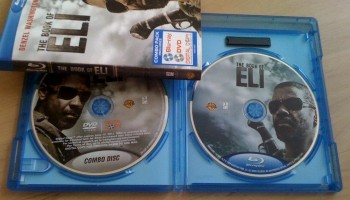 |
Warner Brothers present The Book of Eli in a standard double-disc package, with Disc One being the Blu-ray and Disc Two being a bare-boned DVD / Digital Copy combo disc. A nice, cardboard slipcover has been included that replicated the look of a book on the spine of the presentation -- a slick touch.
Video and Audio:
The high-definition experience that Sony's Blu-ray of The Road forces on-screen, a drab and murky image that accurately retains the utterly bleak look of John Hillcoat's film, isn't the same sort of high-definition experience that Warner Brothers serves up with The Book of Eli. Framed at 2.35:1 and vaulted within a 1080p VC-1 encode that sits at between 15 and 19 mbps on average, there are a lot more opportunities for ferocious textures, contrast complexity, and rigid movement through the action sequences. Similarly, it's a heavily gray image that concentrates of scaling degrees of clays, muted tans, and rich blacks, with hardly any rays of colorful content to be seen until near the end of the picture -- and it all looks exquisite here. Shot with RED One high-definition cameras, much like the ones utilized on Neill Blomkamp's District 9, this dreary, dusty post-apocalyptic atmosphere looks striking.
As we peer over Eli's shoulder while he's glancing down cautiously at the road he's been walking on during one sequence, it embodies just about every impression formulated on roughly three-quarters of the film. His eyesight falls on contorted metal, rocky debris, a dusty haze and a relentless array of contrast levels, supported with sustained and crisp composure. A few textures will seem a bit smooth in certain spots throughout the picture, such as the worn road itself and semi-distanced walls, while others will stun with their clarity -- such as a sequence involving Eli walking towards us on his pathway west, with the grain of another stretch of highway, the texture of mountains, and the rubble all about him. Other scenes, once in Carnegie's clutches at the town, experience splashes of light and more maroon-leaning colors in dimly-lit rooms, which can offer higher-bitrate digital sequences. Most importantly, the action sequences preserve the blitzed, starkly photographed motion without distortion, while ink contrast levels and sun-baked lighting appear unscathed and appealing to the eye.
This experience also hinges on a robust aural onslaught, complete with swiping blades, a fury of gunshots, hand-to-hand combat blasts and other chest-slamming sounds, which the DTS HD Master Audio matches against the visual treatment with equal ferocity. Bombastic audio elements backdrop Eli as he's walking in slow-motion, giving a level of bloated swagger as he struts across the screen, with musical elements trickling to the rear channels with attitude. Yet it's the action sequences that, obviously, steal the show, and there are quite a few doozies wedged into the picture -- including one onslaught on a small house that's an easy entry as a system demo, complete with high and low-level gunshots, bazooka explosions, flare billows and debris splintering from wood. The crisp splings of a blade pierce the high-end of the sound spectrum, while dialogue always remains balanced and audible against the atmosphere to appropriate and enveloping degrees. In short, it's an excellent modern sound design for an aggressive action flick, and it's exactly what was hoped for. English and Spanish 5.1 tracks are also available, along with optional English SDH, French, and Spanish subtitles -- which, for projector owners, will be an aggravation since they appear directly underneath the actual image.
Special Features:
Maximum Movie Mode:
Glancing at the disc specs, one might notice that a Hughes Brothers' commentary hasn't been included. There's a reason for that: this Blu-ray comes equipped with a "survival guide" mode that plants interviews with The Hughes Brothers and production designers, concept art/storyboards and other elements in our view as the film goes along -- and it operates as a richly rewarding interactive experience that mirrors the likes of Silence of the Lambs and The Matrix for their density. A Picture-in-Picture dynamic gets started that takes the sketches, interviews, and supplemental footage, many found in special features accessible on the disc at other points, and slaps them in a concrete-like frame at the lower corners of the image, popping up flawlessly via the BD-Java tech.
Albert Hughes talks about how he didn't get the aesthetic of the film until listening to a Nine Inch Nails song that guided him into the manner of the picture, how they pieced together the central town out of found objects like tractor seats and freeway signs, the operatic house used for Carnegie's base of operations. Furthermore, a "Press Enter To..." option appears in the picture-in-picture at points, so the viewer can explore an element deeper -- which, after pressing the button, takes us into a snippet of an assembly featurette. As has come to be expected from Warner's interactive featurettes, this one encapsulates the gauntlet of special features into one solidly focused experience.
Focus Points (34:24, HD):
These pieces integrate into specific points of the film's construction process, and show how the production design and cinematography capture the look and attitude of The Book of Eli. Though they zero in on individual elements, the context of each featurette also incorporates generalized opinions about the concept art, the difference in the storytelling, how the film's constructed, and other points. They all offer excellent behind-the-scenes footage in showing how the film has been assembled, from construction of the forest and town to the graphic novel-like sketches, while only staying with us for brief time periods so that they can be integrated into the Maximum Movie Mode without dominating too much time. Here's the way that they're separated in these individual elements: The Look of Eli (3:32), Underpass Fight (3:11), Building Carnegie's Town (3:16), The Motorcycle Brigade (2:59), Eli Goes to Battle (3:29), Eli's Mission (1:54), Shootout at George and Martha's (3:53), Eli's Weapon of Choice (2:15), Solara Causes Mayhem (6:24), and Apocalyptic San Francisco (3:28).
Behind the Story: Starting Over (13:03, HD) and Eli's Journey (17:54, HD):
Here, the special features take a more thought-provoking direction, where the content focuses on what the world would be like in a true-to-form post-apocalyptic world. The film's creators and other professors / literary folk offer their insights on the subtext prevalent in the picture, from the construct of the "walking dead" disposition of humanity following a devastating disaster, the need for a spearhead individual to guide people through the light, and how we'd live our lives without our creature comforts -- using the things that are on us as currency to get us by, much like pioneers in the wilderness. The Starting Over featurette then proceeds to zero in on how faith in a higher power would be tailored to a post-trauma world, where the Eli's Journey piece delves into the overall atmosphere crafted through production design and conceptualization of the realm. Both of these feature superb interview time with the cast and crew, while splicing together bits of the film and behind-the-scenes snippets into the mix.
Rounding out the features, we've also got a short in-motion graphic novel that tells the story of Carnegie before the disaster, A Lost Tale: Billy (5:02, HD), as well as a few short Deleted / Alternate Scenes (1:53, HD) and a piece on the film's finely-tuned music entitled The Book of Eli Soundtrack (4:59, HD).
Final Thoughts:
As a sucker for post-apocalyptic material and an admirer of tension-driven performances from Denzel Washington and Gary Oldman, it cam as no surprise that The Book of Eli impresses with its dilapidated atmosphere and performance integrity from the actors -- though Mila Kunis' turn as Solara did take me aback with her wide-eyed depth. And, along with that, it's also not much of a surprise that the visceral prowess that The Hughes Brothers construct with the action kept me on-edge, since their vastly under-appreciated film From Hell evoked the same sensation. However, it's the obvious but prescient nature of its faith-based material that struck a chord, on top of accomplishing everything else embedded within its enthralling two-hour span. Between that, and Warner Brothers' finely-presented Blu-ray rich with an audiovisual punch and supplemental density, this became a surprising film that earns a High Recommendation from this direction. Sure, it could've dug deeper with its components, and the ending requires a level of belief suspension, but what it accomplishes as a multifaceted action flick more than trumps its quibbles.
|
| Popular Reviews |
| Sponsored Links |
|
|
| Sponsored Links |
|
|
| Release List | Reviews | Shop | Newsletter | Forum | DVD Giveaways | Blu-Ray | Advertise |
|
Copyright 2024 DVDTalk.com All Rights Reserved. Legal Info, Privacy Policy, Terms of Use,
Manage Preferences,
Your Privacy Choices | |||||||









